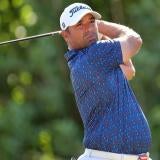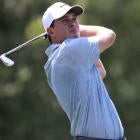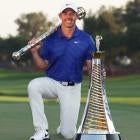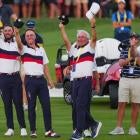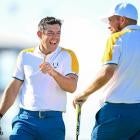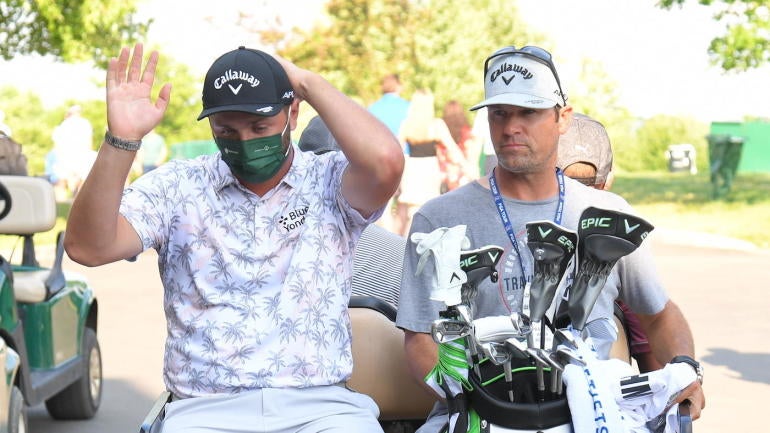
Perhaps Jon Rahm has already received his compensation for what happened to him at last year's Memorial Tournament, but if not, then this year's tournament is the perfect venue to cash it in. Rahm infamously was forced to withdraw directly after his third round after testing positive for COVID-19. He had been tested all week because it was disclosed that he was in close contact with someone who had it so the positive result was not necessarily a surprise. It just came at the worst possible time.
Rahm led the tournament by six at that point and had gained 21 strokes on the field, which is a number that is almost always more than enough to win a PGA Tour event. If he played field average on Sunday, he would likely have won going away. He never got the chance, though, because after he withdrew he flew back home and watched the finale -- a playoff between Patrick Cantlay and Collin Morikawa which Cantlay went on to win -- from his couch.
"I watched it with a lot of grace," Rahm said this week. "I was having fun. I kind of tuned in looking to see how close they got to 18 under which is where I was at. Obviously Sunday was a windy day and it was a tough one. But still, I wanted to watch. I'm a golf fan and I wanted to see who was going to win. Like I said, there was no guarantee that I was going to but I had a pretty good chance."
Cantlay and Morikawa finished at 13 under to get into the playoff, five back of where Rahm finished Round 3. Despite the dispiriting finish to his week in Dublin, Ohio, Rahm carried the momentum into the U.S. Open two weeks later at Torrey Pines and won his first major championship. He said this week that the minutes just after he was forced to withdraw were not as debilitating as you might imagine and that maintaining a good attitude was paramount for Torrey.
"I walked off the course, I was told I couldn't play, and I was mad for about 10 minutes" Rahm said. "I allowed myself to be upset. But instantly my switched flipped and I called my wife and I made sure that she was OK and my son was OK. Once I knew they were OK, I was in my little trailer, that little COVID hut we had, and me and my caddie were laughing. We ordered milkshakes and we were laughing at the funny part of everything, right. I mean, the fact that that happened; that I had a six-shot lead and it's gone, I can't even play, right.
"But at that moment, I chose to just remember how good I had played. I had played really good golf all year last season but it was the first time everything was clicking, and that was right before the thick of the season"
Not only did Rahm win the U.S. Open, but he finished in the top 10 in his next six events, nearly won the Open Championship as well and finished T1 on the Tour Championship shadow leaderboard (not counting the staggered stars to account for the FedEx Cup). He also owned the Ryder Cup. It could be argued that this particular week a year ago spurred him on to the best summer of his career, although it was his tremendous play -- he gained at least four strokes in each of the first three rounds here -- and not necessarily his WD that was the catalyst.
"I chose to just stay in the positive of things," Rahm said. "And when I got home and I was dealing with COVID, I still stayed hopeful. All the hard work I've done the previous months since I switched to Callaway, it doesn't just go like that, right.
"So I was confident when I stepped up at Torrey that I could get it done, and that's what I'm saying, it wasn't really a low."
If Rahm wins this year it won't be because of karma or the universe paying him back, it will be because he owns Muirfield Village. In 13 rounds at Muirfield Village across four tournaments, he's gained 3.4 strokes per round, which is the best of anybody in this field. He's one of just four players who has a lifetime strokes gained number over 2.0. That netted him a win in 2020 at this tournament and it likely would have gotten him another one last year, but even though Rahm has dominated Jack Nicklaus' place, it hasn't always been a venue he's loved.
"The first time I played here in 2017, I believe, for some reason, I absolutely hated it," Rahm said. "I didn't play good. I missed the cut. I think it was my first missed cut as a pro, and I was just like, 'I'm done. Never going back' And Adam, my caddie, kept telling me, 'Man, I'm telling you, this place is great for you. You just need to learn ... certain holes and certain shots, and you'll be great for it.' We came back and I won."
If Rahm comes back to win again this year for the second time in three years (and the third time in three years with an asterisk), it would be a remarkable accomplishment and one of the feel-good stories of the last year in golf. Even if he doesn't, the payoff from keeping his head high and not wallowing in a situation that it would have been easy to find futile led to one of the most important championships of his life as well as the best summer he's ever had. Following that up a year later with this title once again would bring total closure to the incident, but the week "where everything clicked" already got its fairytale ending.






